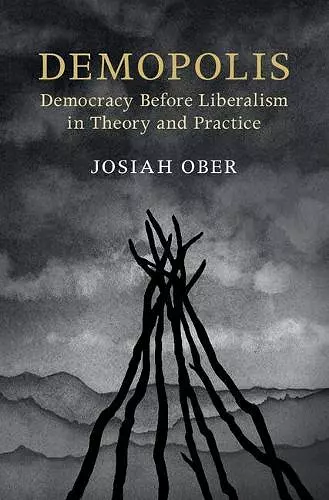Demopolis
Democracy before Liberalism in Theory and Practice
Format:Hardback
Publisher:Cambridge University Press
Published:20th Jul '17
Should be back in stock very soon
This hardback is available in another edition too:
- Paperback£23.00(9781316649831)

What did democracy mean before liberalism? What are the consequences for our lives today? These questions are examined by this book.
What did democracy mean before liberalism? By combining history with political theory, this book restores the core meaning of democracy - collective and limited self-government by citizens. Grounded in political participation and civic education, it is the essential basis of stable, non-tyrannical government - before and after liberalism.What did democracy mean before liberalism? What are the consequences for our lives today? Combining history with political theory, this book restores the core meaning of democracy as collective and limited self-government by citizens. That, rather than majority tyranny, is what democracy meant in ancient Athens, before liberalism. Participatory self-government is the basis of political practice in 'Demopolis', a hypothetical modern state powerfully imagined by award-winning historian and political scientist Josiah Ober. Demopolis' residents aim to establish a secure, prosperous, and non-tyrannical community, where citizens govern as a collective, both directly and through representatives, and willingly assume the costs of self-government because doing so benefits them, both as a group and individually. Basic democracy, as exemplified in real Athens and imagined Demopolis, can provide a stable foundation for a liberal state. It also offers a possible way forward for religious societies seeking a realistic alternative to autocracy.
'Demopolis is Josiah Ober's long-awaited case for the intrinsic value of democracy, not liberal democracy, but democracy simply, the project of collective self-governance. Ober provides a clear and clarifying analytical framework for understanding democracy itself, prior to or apart from its admixture with liberalism. The result is not merely a powerful work in political philosophy but also a compelling argument for the human value of dignitarian democracy: forms of self-rule defined and constrained by the value of human dignity. This book is a masterpiece.' Danielle Allen, Harvard University, Massachusetts
'There is no better guide than Joshiah Ober to Athenian democracy, and now, also to its significance for understanding the value of democracy today, even where modern liberal rights and values may not exist. This book combines history and theory in a political tour de force.' Melissa Lane, Princeton University, New Jersey
'Demopolis is a tightly reasoned work of scholarship … Mr Ober is an excellent writer and his argument is worth the effort. He believes today's liberals, following the political philosopher John Rawls, conflate liberalism and democracy in ways that make it difficult to assess one without the other.' Barton Swaim, Wall Street Journal
'Ober concludes that basic democracy might form an alternative foundation in light of current challenges to liberalism, such as populist nationalism. This conclusion will not convince all, but Ober's work is thorough and thought-provoking. Highly Recommended.' J. Heyrman, Choice
ISBN: 9781316510360
Dimensions: 235mm x 156mm x 14mm
Weight: 480g
222 pages